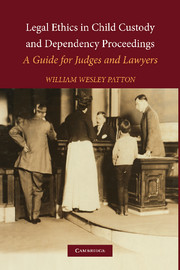Book contents
- Frontmatter
- Contents
- Foreword, by Martin Guggenheim
- Acknowledgments
- Introduction
- 1 Conflicts of Interest
- 2 Competent and Zealous Representation
- 3 Confidentiality
- 4 The Ethics of Alternative Dispute Resolution in Child Custody and Dependency Proceedings
- 5 Ethical Considerations and Constraints in Child Custody and Dependency Appeals
- 6 The Constitutionality of Legislative and Executive Regulation of the Practice of Law and Defining the Attorney-Client Relationship
- Appendix A National Association of Counsel for Children Standards
- Appendix B American Bar Association Standards of Practice for Lawyers Who Represent Children in Abuse and Neglect Cases
- Appendix C In re Car Simulation and Analysis
- Other Authorities
- Cases and Ethics Opinions
- Index
2 - Competent and Zealous Representation
Published online by Cambridge University Press: 24 July 2009
- Frontmatter
- Contents
- Foreword, by Martin Guggenheim
- Acknowledgments
- Introduction
- 1 Conflicts of Interest
- 2 Competent and Zealous Representation
- 3 Confidentiality
- 4 The Ethics of Alternative Dispute Resolution in Child Custody and Dependency Proceedings
- 5 Ethical Considerations and Constraints in Child Custody and Dependency Appeals
- 6 The Constitutionality of Legislative and Executive Regulation of the Practice of Law and Defining the Attorney-Client Relationship
- Appendix A National Association of Counsel for Children Standards
- Appendix B American Bar Association Standards of Practice for Lawyers Who Represent Children in Abuse and Neglect Cases
- Appendix C In re Car Simulation and Analysis
- Other Authorities
- Cases and Ethics Opinions
- Index
Summary
The requirement of competency is perhaps less controversial than the mandate for zealousness. Media and lay portrayals of the evils of the legal system circle around a mistaken understanding of the meaning and importance of zealousness, which has become synonymous with frivolous causes of action and with grand incivility among those involved in the legal system. It is not surprising, therefore, that the express requirement of Canon 7 of the ABA Code of Professional Responsibility that “[a] lawyer should represent a client zealously within the bounds of the law” was eliminated from the ABA Model Rules of Professional Conduct except in the Preamble and Comments. And the American Academy of Matrimonial Lawyers has noted that zealous representation “is not always appropriate in family law matters.” In contrast, the concept of competence has received a radically different reception by the public and bar, and it is not surprising that it is the first rule in the ABA Model Rules of Professional Responsibility.
Rather than disappearing, the requirement of competency has not only survived numerous ethical code iterations but it has also been refined and expanded. For instance, in many jurisdictions competency to represent children in child dependency proceedings now requires knowledge in areas well beyond legal theory. For instance, in California the superior court is required to screen and appoint “competent” counsel with sufficient minimum standards of education in “the law of juvenile dependency” and in “child development, child abuse and neglect, substance abuse, [and] domestic violence….”
- Type
- Chapter
- Information
- Legal Ethics in Child Custody and Dependency ProceedingsA Guide for Judges and Lawyers, pp. 27 - 67Publisher: Cambridge University PressPrint publication year: 2006



